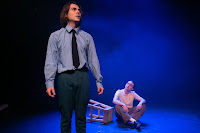The Mother of Kamal
by Dina Ibrahim
dir Stephen Freeman
with Dina Ibrahim, Mirdrit Zhinipotoku, Jojo Rosales, Nalân Burgess, Manav Chaudhuri
music Jon Kudlick • lighting George Petty
costumes Alice McNicholas • sound Aidan Good
The Gatehouse, Highgate • 19-28.Jan.24 ★★★Actor-writer Dina Ibrahim has adapted the autobiographical novel Um-Kamal, written by her father Fawzi Ibrahim, and she is essentially playing her grandmother on-stage. The first-hand nature of the narrative gives the play an often startling attention to detail, capturing small moments with an emotional sensibility. Conversely, this also means that there is too much going on for the audience to completely engage in the story. The central narrative is compelling, but it is recounted with too many characters and diversions. And the lack of an accessible perspective is a problem.
With a bit of time jumping, the story starts in 1948 Baghdad as the working class Jewish Ibrahim family tries to navigate a tricky religious and political landscape. With Nazi anti-semitism in the air, officials are particularly paranoid about communists. Suddenly, teen son Kamal (Zhinipotoku) and younger brother Sasson (Rosales) are arrested as subversives. Their mother (Ibrahim) is distraught, and when she tries to get them released is horrified to be forced to make an impossible choice. Meanwhile in prison, Kamal and Sasson take very different approaches to their predicament. The decisions they make propel the family through the next few decades, leading ultimately to a reckoning with their past.
There's real power in the central narrative, especially as it weaves in refreshingly complex ideas about fate. So this mother and sons feel like their actions have had momentous repercussions, when the situation was far more nuanced than they knew. The script almost misses this idea in its effort to pack in so many encounters, some of which take place on-stage alongside each other as the five cast members switch between a bewildering array of characters. Many of these people appear in just one intensely emotional scene, so it's impossible to work out who they are or what they mean in the greater scheme of things.Because this is such a wrenching story, the actors play the roles with a heightened intensity, conveying their feelings to the back of the theatre. These over-sized performances are especially notable due to the offbeat casting, in which actors play a range of ages and ethnicities against type. Zhinipotoku and Rosales are able to create vivid characters, and Ibrahim plays her emotions to the hilt, but other connections are unclear over a decades-long timeline. And several well-played roles are lost in the shuffle, most notably the boys' father (Chaudhuri).
This is an ambitious production, using bursts of loud music, bright lights and smoke to add to the atmosphere, plus several surreal sequences involving choreographed movement. The stage itself is effective and simple, nicely isolating each scene. So if the script and direction were more focussed, telling the story with a singular point of view that allows the audience to identify with a character and lean into the situations, the vitality and importance of the material would hit with much more force.For details, UPSTAIRS AT THE GATEHOUSE >
photos by Gary Manhine • 19.Jan.24







No comments:
Post a Comment